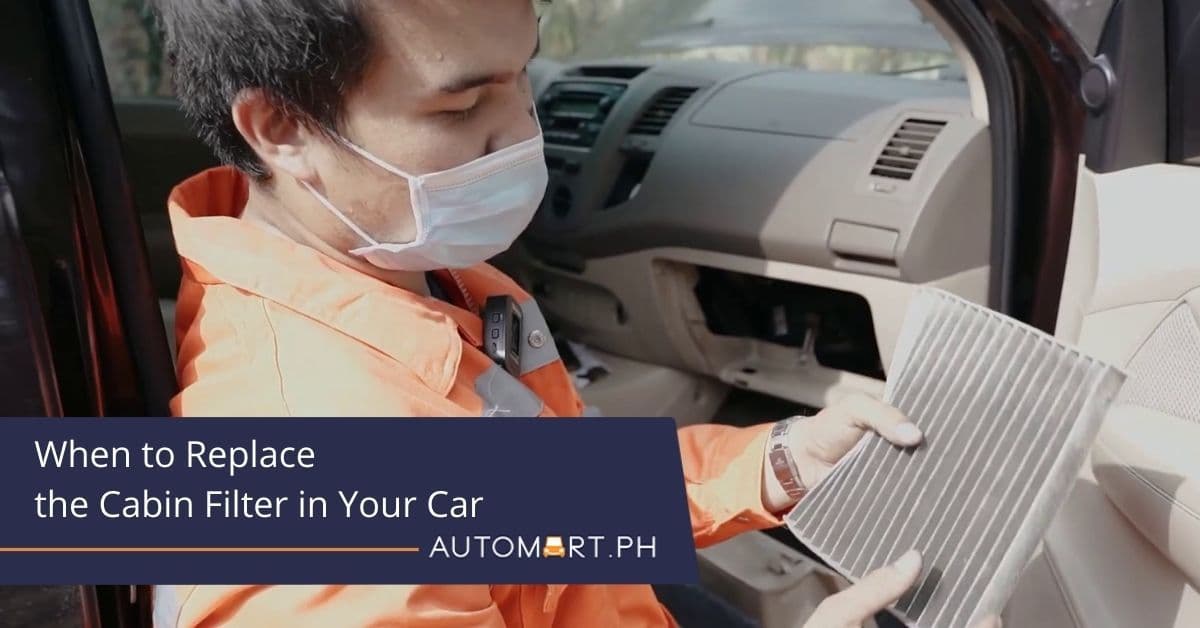
When to Replace the Cabin Filter in Your Car
Updated on December 18 2025
The cabin filter in your car is similar to the engine's air filter: It does not last forever, and it needs periodic replacement to maintain the best filtering efficiency. The cabin filter starts working the moment you turn on the air-conditioning, and we all know that driving in humid Philippine weather requires the A/C to be in full blast every time we hit the roads.
However, constantly using the A/C means the cabin filter works overtime to rid the air of dust, pollens, allergens, and other debris. And like the filters in your home A/C, the cabin filter needs periodic cleaning or replacement to maintain the air quality. Most car owners know how to replace the cabin filter, but do you have any idea when to replace it?
What is a cabin filter?

The cabin filter purifies the air that enters the cabin via the heating or air-conditioning system. It not only keeps the cabin air healthy, but it prevents dust, allergens, mold spores, and pollen from intruding on the air quality inside your car. The cabin filter is critically important if you suffer from sinus allergies, asthma attacks, or if sensitive to dust, diesel smoke, and pollution.
Where is the cabin filter located?

In most cars, the cabin filter is resting in a small compartment behind the glove box. And in most cases, you can access and replace the cabin filter without using any hand tools. Other vehicles may have two or more cabin filters in multiple locations inside the cabin. When in doubt, the owner's manual will show you the exact location of the cabin filter in your car.
When to Replace the Cabin Filter: Watch Out For These Telltale Signs

The cabin filter is a serviceable component and requires periodic replacing. The general rule is to replace the cabin filter at least once a year or every 20,000 kilometers, but the period for replacement is dependent on the make and model of your vehicle. In addition, you may need to replace the cabin filter more frequently if you constantly drive in dusty areas.
But if you just bought a used car or if you are not sure about the cabin filter's condition, here are the telltale signs of a dirty or clogged cabin filter.
1. Weak airflow
Remember, there are no warning lights or indication lamps to know if the cabin filter needs replacing. But if you notice a weaker airflow from the A/C vents than usual, it may be time to replace the cabin filter. For instance, if you have to increase the fan speed to get the same volume of cool air, check the cabin filter before blaming the fault on a broken fan motor.
2. Unusual whistling sounds
Do you hear unusual whistling or rustling sounds behind the dashboard or glove box while the air-conditioner is ON? That sound is a primary indicator of a dirty or clogged air filter.
3. Foul odor emanating from the A/C vents
If you notice a foul odor from the A/C vents when using the air-conditioning, you could be dealing with either a dirty air filter, a dirty A/C system, or both. Try replacing the cabin filter to get rid of the musty odor. If the scent remains, you may need to have the A/C serviced and cleaned.
4. More dust on the interior
Like death and taxes, dust is unavoidable. Even if you avoid driving with the windows down, dust will find a way to settle on your car's dashboard and center console. But if you notice an increased presence of dust inside your car, check the cabin filter.
5. Visual inspection
If you could remove the cabin filter and make a visual inspection, it doesn’t take an expert to know if the filter element needs replacing. If the filter is a dark, jagged, and gooey mess, replace it immediately.
How do I replace the cabin filter?
In most cars, the cabin filter removes easily without using any tools. The basic procedure is to lower or remove the glove compartment, remove the cover, and pull out the cabin filter. The video below has everything you need to know on how to replace the cabin filter.
What cabin filter should I buy?
The stock paper air filter offers the best compromise between cost, efficiency, and service life. Other vehicles come with stock N95 cabin filters to provide better protection against viruses and allergens. Additionally, you can purchase an aftermarket cabin filter that is washable, reusable, and capable of lasting the life of your vehicle, albeit at a higher cost.